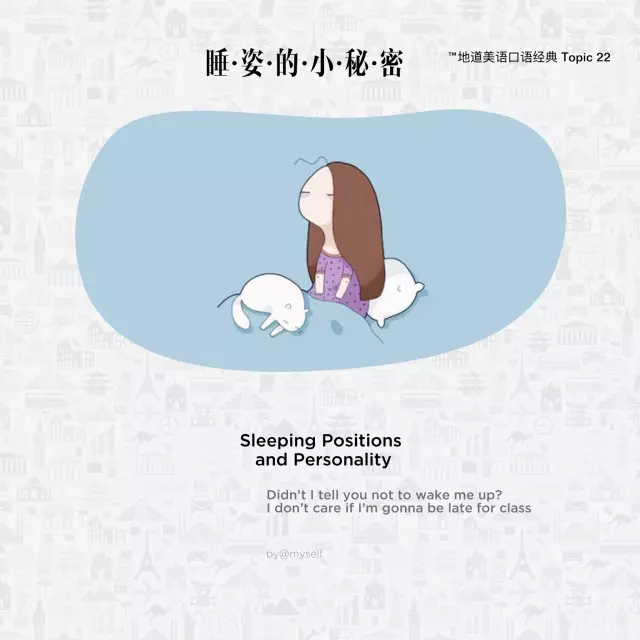Dialogue 1
Jingjing: Mark! Yoo hoo! Wake up sleepyhead! You're gonna be late for class.
京晶:馬克!嘿嘿!快醒醒,貪睡蟲!你上課要遲到啦。
Mark: Hey! Didn't I tell you not to wake me up? I don't care if I'm gonna be late for class. I don't like it you mess with me when I'm sleeping.
馬克:嘿!我不是告訴過你不要叫我起床嗎?我不在乎遲到。我不喜歡你在我睡覺的時候惹我。
Jingjing: Oh? You wanna start acting all hard with me now? I was just doing you a favor by making sure you make it to school on time.
京晶:哦?你現(xiàn)在是假裝發(fā)脾氣嗎?我只是想幫你而已,確保你準(zhǔn)時到校。
Mark: What makes you think I'm acting? I'm serious.
馬克:你認(rèn)為我在演戲?我是認(rèn)真的。
Jingjing: Ha! I don't believe you! I know you're a sweet guy on the inside. Besides, when I woke you up, you were in the fetus position. That says a lot about your personality.
京晶:哈!我不相信你!我知道你是一個內(nèi)心溫柔的家伙。況且,當(dāng)我叫你的時候你是胎兒式睡姿。這很能說明你的個性。
Mark: Wait, you mean you can tell something about someone's personality just by looking at how they fall asleep?
馬克:等一下,你的意思是光看一個人怎么睡覺就能知道他的性格?
Jingjing: Yup, pretty much.
京晶:是啊,八九不離十。
Mark: So, you gonna fill me in?
馬克:你能詳細(xì)講講嗎?
Jingjing: Ok, well, this professor in the UK named Chris Idzikowski analyzed six common sleeping positions, and found that they're linked to personality types. For example, people who fall asleep in the fetus position, which is the most common position to fall asleep in, are tough on the outside but sensitive and sweet on the inside.
京晶:好吧,嗯,有個叫克里斯·伊德茲科夫斯基的英國教授分析了六種常見的睡姿,并發(fā)現(xiàn)它們和人的性格類型緊密相關(guān)。例如,胎兒式睡姿的人,也是最常見的一種姿勢,外表看起來很堅強,但內(nèi)心很敏感和溫柔。
Mark: Okay, that sounds like me... What else?
馬克:好吧,這聽起來很像我……還有什么呢?
Jingjing: People who lie on their sides with both arms down sleep in the log position. They're easygoing and like being part of the in-crowd. However, they are often said to be gullible.
京晶:側(cè)躺雙臂垂下睡覺的人是木樁式睡姿。他們隨和,喜歡到人多的地方并成為他們的一份子。然而,他們往往愛輕信別人。
Mark: Okay, this is getting interesting. But right now I don't have time to chat. I gotta get going. Tell me the rest on the way to school.
馬克:好吧,聽起來越來越有趣了。但現(xiàn)在我沒有時間聊天了,我得走了。我們路上說吧。

Dialogue 2
Jingjing and Mark are on their way to school. They continue their conversation.
京晶和馬克在上學(xué)的路上,繼續(xù)他們的談話。
Mark: So you said there were six common sleeping positions? You told me two already. What are the other four?
馬克:所以,你說有六種常見的睡姿?你告訴我兩個了,另外四個是什么?
Jingjing: Oh, yeah, that's right. There's the yearner position. These people lie on their side with their arms out in front of them. They're said to be really open people, but also suspicious and cynical at the same time.
京晶:哦,對。還有渴望狀睡姿的人。他們側(cè)躺,雙手向前伸出,據(jù)說這類人很開放,但是也很多疑,喜歡冷嘲熱諷。
Mark: Okay, keep talking...
馬克:好吧,繼續(xù)……
Jingjing: Then there's the soldier position. These people lie on their back with their arms at their sides. These people are often quiet and reserved. They don't like a fuss, but set high standards for themselves and others.
京晶:然后還有士兵式睡姿。這些人平躺著睡,手臂放在身體兩側(cè)。以這種姿勢睡覺的人普遍很安靜和保守。他們不喜歡大驚小怪,但是對自己和別人的要求都很高……
Mark: Sounds kinda like you...
馬克:聽起來還挺像你……
Jingjing: You're wrong! I sleep in the starfish position. These people lie on their backs with both arms around the pillow. People like us make great friends because we're always ready to listen to other people's problems.
京晶:你錯了!我是海星式。睡覺的時候會平躺著,雙手環(huán)繞在枕頭上。像我們這樣的人可以成為非常好的朋友,因為我們總是愿意傾聽別人的問題。
Mark: How do you know you sleep like that? You can't see yourself when you're sleeping!
馬克:你怎么知道你睡覺什么樣?你睡覺的時候又看不見自己!
Jingjing: I'm sure I sleep like that because I'm such a great friend to other people! How could I not be? Anyways, the last position is called the free fall position. These people lie on their stomachs with their hands around the pillow and their head turned to one side. They're often gregarious people, but can be thin-skinned underneath. They also don't like criticism, so be careful!
京晶:我敢肯定我就是那樣睡覺的,因為我是最棒的朋友啦!我怎么可能不是海星式呢?無論如何,最后一個睡姿被稱為自由落體式。這些人睡覺趴在床上,同時兩手抱在枕頭附近,頭轉(zhuǎn)向一側(cè)。他們通常是社交型的人,但實際上臉皮很薄,不喜歡別人的批評,所以你要小心!
Mark: Well, thanks for the heads up. Anyways, I gotta run to class. We'll catch up later, ok?
馬克:嗯嗯,謝謝你的提示。不管怎么說,我得趕去上課啦。我們回頭聊吧,好嗎?
Jingjing: Sounds good, take care!
京晶:好的,回見!











